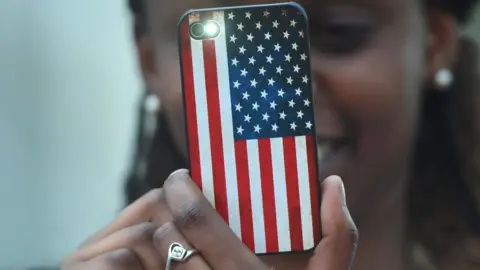Phone and laptop searches at US border 'quadruple'
 Getty Images
Getty ImagesSearches of travellers' laptops and mobile phones at the US border have nearly quadrupled since 2015, digital rights groups have claimed in a federal lawsuit.
The searches are often warrantless and therefore "unconstitutional", allege the plaintiffs.
The lawsuit says that border agents are attempting to enforce laws beyond their purview of customs and immigration.
However, US officials say the agents do have a wide investigative remit.
There were 33,295 searches of travellers' devices in the 2018 financial year.
They were carried out for a broad range of reasons - including intelligence gathering, tax enforcement and criminal investigations - according to the rights groups EFF and American Civil Liberties Union (ACLU), which filed the lawsuit.
'Fellow travellers targeted'
It is also alleged that friends, relatives or associates of travellers targeted for searches were often told to surrender their devices.
"The government cannot use the pretext of the 'border' to make an end run around the Constitution," the ACLU said in a statement.
Government agencies appear to be taking a different view of the situation.
In a court filing, an official with Immigration and Customs Enforcement (ICE) said: "So perhaps in a fraud investigation, one business might want to report their competitors for engaging in fraudulent business practices.
"And that would be a factor that might give an agent reasonable suspicion for a border search."
So-called warrantless searches at the US border have been challenged in court before - and upheld.
"The Constitution clearly protects the rights of all persons in the US, not just citizens," said Edin Omanovic at Privacy International, which is not involved in the lawsuit.
"US authorities should absolutely and at the very minimum have some kind of suspicion and a warrant before trawling through people's devices."
